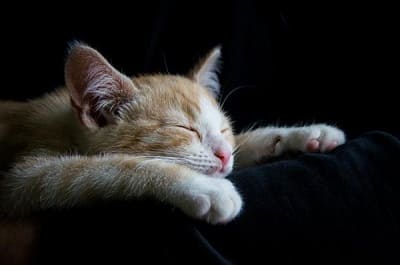My cat snores: is it normal?
If your cat feels safe next to you, it is quite normal for him to lie down and rest near you. In some of those moments you may be surprised by a snoring from your cat. That a snoring cat can happen for many reasons, some of them are not serious, but others do require veterinary attention. For this reason, if you say to yourself «my cat snores», the best thing you can do is to know the possible causes to know when to be more attentive.

What is a snore?
Snoring is a hoarse or loud sound made when air passes through the relaxed tissues in your throat, causing them to vibrate as you breathe.
Virtually all people snore from time to time, but in addition, snoring can also be common in some animals.
Therefore, it is not surprising that at some point you exclaim: «My cat snores!».
My cat snores: is it normal?
The sounds of cats are numerous (for example, the meow, the snort or the purr) and thanks to them we can come to understand them better, since they are one of the ways they have to communicate. However, snoring is not part of the common sounds that cats make as a form of communication.
Even so, the fact that a cat snores does not have to be something abnormal. The important thing is to take into account when and to what extent the cat snores.
A priori, it is not at all alarming if the cat snores only at night and slightly. However, if you notice signs that something is wrong with your cat, the snoring may be signs of a more serious cause.
When can it be worrying that a cat snores?
If your cat snores and also shows any of these signs, it could be due to a more serious cause:
The animal looks weak.
You suffer from dyspnea (lack of air or difficulty breathing).
He has fever.
There is a runny nose.
He has lost weight.
He doesn’t want to eat.
He coughs a lot.
Makes other noises when breathing and snoring.
You have swollen lymph nodes.
In very serious cases, the cat can only breathe through its mouth directly.
In any of these cases, it is essential that you go with your pet to the vet.
Why does my cat snore? Causes of snoring in cats
There are several answers to the question why my cat snores. Let’s see what they are.
A foreign body in your airways
Since cats are explorers by nature, if they go outside, it is normal that in one of those processes of sniffing everything, a foreign body enters their respiratory tract. For example, grass, spikes, or ridges.
When these elements enter the cat’s nose, the airways narrow and this causes the cat to snore and whistle. It can also be a sign of this if the cat sneezes, is very upset and desperately puts its paws to its mouth, as if trying to remove something from it.
In addition, if these bodies become embedded in the surrounding tissue, painful swelling, nasal secretions and/or nosebleeds can occur.
Overweight and obesity
Excess weight in the animal is detrimental to its health for various reasons. For example, it may be the reason why, over time, the animal develops other diseases, such as diabetes in cats or metabolic problems.
In addition, when you carry more than the recommended weight, your organs are put under pressure, such as your lungs, as well as other parts of your body, such as your trachea.
Being overloaded prevents proper ventilation, which can sometimes cause the animal to snore or make other sounds when breathing.
allergies
Cats can be allergic to many things: dust mites, pollen, food allergies, etc.
An allergic reaction can cause inflammation and narrowing of the cat’s airways, which consequently causes snoring.
In addition, allergies can present other symptoms, such as sneezing or hives.
